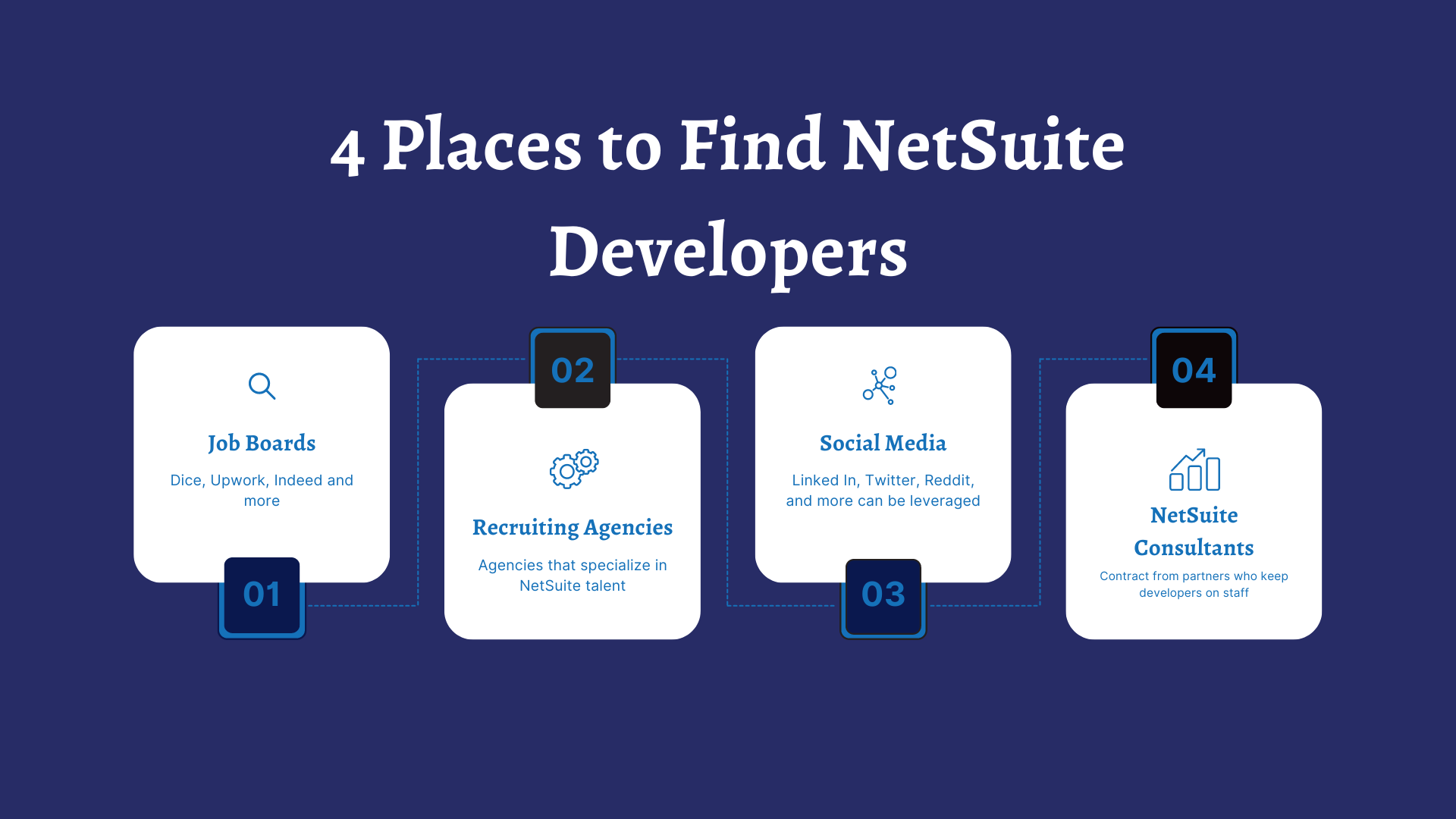- CALL : (+1) 407-273-1001
- Main Office : (+1) 407-273-1001
- NetSuite NetSuite Customization NetSuite Integration
- Dec 22
- 9 mins read
NetSuite Developer: The 2023 Guide to What, Where, + Why
What is NetSuite Development and Why Do you Need a NetSuite Developer?
NetSuite development is the process of creating custom applications and integrations using the NetSuite platform. NetSuite is a cloud-based software suite that provides a range of business applications, including financial management, customer relationship management (CRM), and e-commerce.
Finding skilled NetSuite developers is important because they play a crucial role in helping businesses customize and extend the functionality of the NetSuite platform to meet their specific needs and requirements. NetSuite developers must have a strong understanding of the NetSuite platform and its capabilities, as well as programming skills and the ability to work closely with business stakeholders to understand and meet their needs.
In today’s business environment, the ability to effectively use and customize cloud-based software platforms like NetSuite is increasingly important for businesses to remain competitive and drive growth. As a result, the demand for skilled NetSuite developers is likely to continue to grow in the coming years.
This article will provide valuable information for businesses looking to hire a NetSuite developer. It will cover topics such as determining your NetSuite development needs, identifying the skills and experience you need in a NetSuite developer, searching for and evaluating potential candidates, and tips for conducting an effective interview. By following the advice in this article, businesses will be well-equipped to find and hire the best NetSuite developer for their needs.
What is a NetSuite Developer?
A NetSuite developer is a software developer who specializes in working with the NetSuite platform. The role of a NetSuite developer is to design, develop, and maintain custom applications and integrations using the NetSuite platform. This may involve creating new applications from scratch, modifying and customizing existing functionality, or integrating NetSuite with other systems and applications.
The responsibilities and tasks involved in the role of a NetSuite developer may include:
- Analyzing business requirements and translating them into functional specifications
- Designing and developing custom applications and integrations using the NetSuite platform and related technologies
- Testing and debugging custom applications and integrations to ensure they are functioning properly
- Maintaining and updating custom applications and integrations as needed
- Working closely with business stakeholders to understand their needs and ensure that custom solutions meet their requirements
- Staying up-to-date with the latest developments in NetSuite technology and best practices for development
To be a successful NetSuite developer, it is important to have a strong understanding of the NetSuite platform and its capabilities, as well as programming skills. This may include knowledge of languages such as JavaScript, HTML, and CSS, as well as experience with development tools such as SuiteScript and SuiteFlow. NetSuite developers should also have strong problem-solving and analytical skills, as well as the ability to work effectively in a team environment.
What Can a NetSuite Developer Do With NetSuite?
NetSuite development is important for businesses because it allows them to customize and extend the functionality of the NetSuite platform to meet their specific needs and requirements. This can help drive growth and improve efficiency by allowing businesses to automate and streamline processes, access real-time data and insights, and integrate with other systems and applications.
The NetSuite platform provides a range of business applications, including financial management, customer relationship management (CRM), and e-commerce. These applications can be leveraged through custom development to support a wide range of business needs, such as:
- Automating and streamlining financial processes, such as invoicing, accounts payable, and expense management
- Improving customer relationship management by integrating with CRM systems and automating sales and marketing processes
- Building custom e-commerce solutions that integrate with the NetSuite platform, such as online stores and shopping carts
- Creating custom reports and dashboards to provide real-time insights into business performance
- Integrating NetSuite with other systems and applications, such as HR systems, marketing platforms, and logistics software
Custom development using the NetSuite platform can help businesses to better utilize the capabilities of the platform and improve their operations. By working with a skilled NetSuite developer, businesses can tailor the platform to meet their specific needs and drive growth and efficiency.
How to Find a NetSuite Developer
Here are some places a business in need can go to find a NetSuite developer:

- Job boards: There are many online job boards that allow businesses to search for and post job openings for NetSuite developers. Some popular job boards for software developers include LinkedIn and Indeed
- Recruiting agencies: Another option is to work with a recruiting agency that specializes in finding and placing NetSuite developers. These agencies can help businesses to identify and recruit top talent in the field.
- Social media: Social media platforms such as LinkedIn and Twitter can be useful for finding NetSuite developers and connecting with professionals in the field. Businesses can search for and join relevant groups or communities, and network with other professionals to find potential candidates.
- NetSuite Consultants: Often times, a NetSuite consulting company will have NetSuite developers on staff to help the NetSuite customers that they serve. You will have to contract their services, however, this may be in your interest if you’re only going to need a NetSuite developer for a brief period of time or for a specific project. If you are currently looking for a NetSuite developer, eMerge Technologies has experienced and proven developers on staff that would be happy to help you.
If you do decide to go through a consultant to find a developer, look for these 3 factors when deciding which one is right for you.
- Communication and collaboration: It’s important to choose a developer who is able to communicate clearly and effectively and who is willing to collaborate with you to understand your business needs and goals.
- Availability and responsiveness: Look for a developer who is responsive and able to commit to a timeline that meets your needs. Make sure to discuss your project’s timeline and any potential delays or issues that may arise.
- Cost: Consider the developer’s hourly rate or project fee and make sure it is within your budget. It’s important to remember that price is not the only factor to consider, as choosing a lower-priced developer may not necessarily result in the best quality work.
To effectively search for NetSuite developers, businesses can follow these tips:
- Use targeted keywords: When searching for NetSuite developers on job boards or social media, use keywords such as “NetSuite developer,” “SuiteScript,” and “SuiteFlow” to narrow down the results to relevant candidates.
- Network with other professionals: Connecting with other professionals in the field, such as other NetSuite developers or professionals who have worked with NetSuite developers in the past, can be a valuable source of leads and referrals.
- Consider location: Depending on your business’s location and needs, you may want to consider searching for NetSuite developers in a specific region or location.
- Be clear about your requirements: When posting job openings or searching for candidates, be clear about the skills, experience, and responsibilities you are looking for in a NetSuite developer. This will help to attract the right candidates and make the hiring process more efficient.
How to Evaluate and Interview NetSuite Developers.
Evaluating and interviewing potential NetSuite developers is an important step in the hiring process to ensure that you find the right fit for your business. Here are some tips for what to look for in a NetSuite developer and how to conduct an effective interview:
- Look for technical skills and knowledge: NetSuite developers should have a strong understanding of the NetSuite platform and its capabilities, as well as programming skills and experience with relevant tools such as SuiteScript and SuiteFlow. Consider asking candidates to provide examples of past projects or challenges they have worked on and how they approached them.
- Evaluate problem-solving skills: NetSuite developers should have strong problem-solving skills and the ability to think critically and creatively to find solutions to complex challenges. Consider asking candidates to describe how they approach problem-solving and how they handle challenges that arise during development projects.
- Assess communication skills: NetSuite developers will often work closely with business stakeholders and other team members, so it is important that they have strong communication skills. Consider asking candidates to describe how they communicate with clients or team members and how they handle difficult conversations.
- Consider teamwork and collaboration: NetSuite developers should be able to work effectively in a team environment and be able to collaborate with others to achieve common goals. Consider asking candidates about their experience working on team projects and how they contribute to a positive team dynamic.
- Test their knowledge: Consider giving candidates a test or technical challenge to assess their knowledge and skills. This could involve asking them to write code or solve a problem using the NetSuite platform.
Example Interview Questions and Answers
- Can you describe the key features and capabilities of the NetSuite platform and how they can be leveraged through custom development?“The NetSuite platform provides a range of business applications, including financial management, customer relationship management (CRM), and e-commerce. These applications can be leveraged through custom development to support a wide range of business needs, such as automating financial processes, improving customer relationship management, and building custom e-commerce solutions. I have experience working with the NetSuite platform to design and develop custom applications and integrations that meet the specific needs of my clients.”
- How do you use SuiteScript and SuiteFlow in your custom development projects? Can you provide an example of a project where you used these tools?“I use SuiteScript and SuiteFlow in my custom development projects to customize and extend the functionality of the NetSuite platform. For example, I recently worked on a project where I used SuiteScript to create a custom integration between NetSuite and a third-party marketing platform. This allowed the client to automate their marketing campaigns and track the results directly within NetSuite. I also used SuiteFlow to create a custom workflow that automated the approval process for new vendor accounts.”
- Can you describe the different types of custom records that can be created in NetSuite and how they are used?“There are several types of custom records that can be created in NetSuite, including standard records, transactions, and custom transactions. Standard records are used to store data that is specific to a particular business need, such as a custom product record. Transactions are used to store data related to business transactions, such as invoices and purchase orders. Custom transactions are used to store data that is specific to a particular business need, such as a custom time tracking record. I have experience working with all of these types of custom records to store and manage data in NetSuite.”
- How do you handle data integration and integration with other systems and applications using NetSuite? Can you provide an example of a project where you integrated NetSuite with another system or application?“I handle data integration and integration with other systems and applications using NetSuite by leveraging tools such as web services, SuiteTalk, and SuiteScript. For example, I recently worked on a project where I used SuiteScript to create a custom integration between NetSuite and a third-party HR system. This allowed the client to automate employee onboarding and offboarding processes and keep employee data up-to-date in both systems. I also used SuiteTalk to integrate NetSuite with a third-party logistics platform, which allowed the client to automate their shipping and tracking processes.”
- Can you describe how you use custom fields and custom forms in NetSuite to capture and display data?“I use custom fields and custom forms in NetSuite to capture and display data in a variety of ways. For example, I have experience creating custom fields to capture data specific to a particular business need, such as a custom field for tracking the warranty expiration date of a product. I also have experience creating custom forms to display data in a specific format or layout, such as a custom form for displaying customer quotes. I use these tools to design custom solutions that meet the specific needs of my clients.”
- Can you describe how you use custom records and custom fields to create custom reports and dashboards in NetSuite?“I use custom records and custom fields to create custom reports and dashboards in NetSuite to provide clients with insight into their business data. For example, I have experience creating custom reports that display data from multiple sources, such as sales data, customer data, and inventory data, and custom dashboards that provide a visual representation of key metrics and trends. I use these tools to design custom solutions that meet the specific needs of my clients.”
- Can you describe the different types of NetSuite workflows and when you would use each type? Can you provide an example of a project where you used a workflow to automate a process?“There are several types of NetSuite workflows, including approval workflows, notification workflows, and scheduling workflows. Approval workflows are used to automate the approval process for business transactions, such as invoices and purchase orders. Notification workflows are used to send notifications to users or external parties when specific events occur, such as when a customer places an order. Scheduling workflows are used to schedule tasks or events, such as sending emails or updating records. I have experience working with all of these types of workflows and have used them to automate a variety of business processes. For example, I recently used an approval workflow to automate the approval process for new vendor accounts, which saved the client time and improved efficiency.”
NetSuite Developers FAQ
What does a NetSuite developer do?
A NetSuite developer is responsible for developing and customizing NetSuite ERP solutions to meet the specific needs of their clients or company. They work with business analysts to understand requirements, design and develop customizations, and integrate third-party applications.
Does NetSuite Require Coding?
NetSuite does not require coding to use out of the box. However, if you want to extend the functionality of NetSuite coding can be used. NetSuite uses JavaScript, SuiteScript, and other programming languages to customize and extend its functionality.
What Programming Language Does NetSuite Use?
NetSuite primarily uses JavaScript and SuiteScript for customization, scripting, and automation. Additionally, NetSuite supports several other languages, including SQL, Java, Python, and C#.
What Skills are Required for a NetSuite Developer?
A NetSuite developer should have knowledge of NetSuite architecture, SuiteScript, and JavaScript, as well as experience with software development methodologies, such as Agile or Waterfall. Strong communication, problem-solving, and critical thinking skills are also important.
Does NetSuite Use SQL
Yes, NetSuite supports SQL. NetSuite’s SuiteQL is a SQL-based query language that allows developers to query data from the NetSuite database using SQL statements. Additionally, NetSuite supports ODBC and JDBC for data integration.
Final Thoughts
In conclusion, hiring a NetSuite developer is a smart move for any business looking to get the most out of their NetSuite system. These highly skilled professionals have the technical expertise and industry knowledge to customize and optimize NetSuite for your specific needs, helping you streamline your operations and drive business growth.
So if you’re considering hiring a NetSuite developer, don’t hesitate – the benefits are well worth the investment. And if you have any questions or comments, please don’t hesitate to leave them in the comments below. We’d love to hear from you!
Jeremy McCourt is an content producer in the enterprise software industry that focuses on NetSuite and related cloud-based software solutions.
Related Posts

NetSuite Training 101 (The 2023 Complete Guide)
NetSuite training is an underrated and often overlooked part of the NetSuite ecosystem. In this article, we do what we can to break down why NetSuite training is a critical part of NetSuite users finding…
- Aug 21
- 6 mins read

What is NetSuite Customization? The 2023 Complete Guide
NetSuite, as a leading cloud-based ERP system, has gained immense popularity among businesses worldwide. However, to truly harness its potential, customization is often necessary. In this comprehensive guide, we delve into the world of NetSuite…
- Aug 16
- 6 mins read
